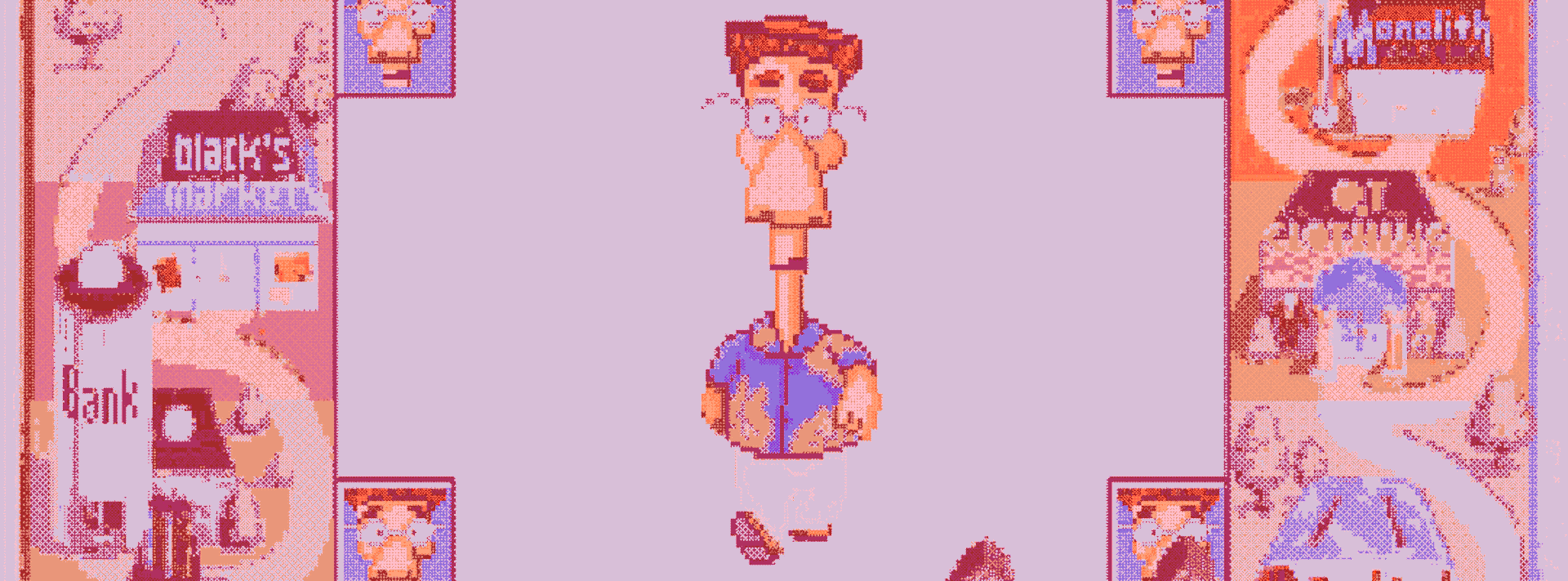Week 12 — More thoughts on the final project game.
Yesterday I posted about the up-coming game for the final masters project, and I wasn’t sure about what to make. What I know is that I do want to make something important, with a special message. Not quite sure what it is yet.
A game I have been thinking about making over the past year is inspired by Jones in the Fast Lane (which you can play here). I wrote about it whilst doing the CalArts game design specialisation, and filed it under “SuperMe” for lack of a better working title.

(Screenshot of “Jones in the Fast Lane “, Copyright 1991 Sierra Entertainment)
Those posts covered world design and character art a bit, but I have not thought about the game mechanics yet. However, I’ve learnt more about game design recently, so now might be a good time to start.
In a nutshell, you’re a person who’s new to a city, and want to get on the career ladder and start earning some cash and prestige. However, in the game (like in life) there are:
- things which can make the protagonist’s life better
- things which can make the protagonist’s life worse
Things that can make your life better are: fulfillment, education, luxury, health, good food, wealth and investments. And worse are: rent, theft, fire, water damage, sickness, emergencies, accidents.
I want to make the game fun and give the player a sense of flow (Csikszentmihalyi 2013) by expertly balancing the good and the bad (Macklin and Sharp 2016: 25). The player might spend their first salary on a new TV, but then they have a fire later that week, which means more than just the new TV got damaged. Perhaps insurance would have been a good first buy? Or maybe cheaper entry-level insurance, and a cheap radio?
Regardless what you spend your money on, rent is soon due, and you’ll watch in frustration as your landlord “garnishes” a bit off your pay every time you work, and you can never quite catch up to pay her back fully. In this regard, this game really opens your eyes to how poverty happens for some folks. Perhaps this could be my special message?
...games can actually play a powerful role in creating empathy and other strong, positive emotional experiences.
(Isbister 2017: xvii)
A simpler example of a well-balanced game might be the classic rock-paper-scissors, where you have a circular win/lose dependency. You see this in tower defense and strategy games too, where you can typically choose to play as one of three possible factions, and no one faction is stronger than any other, although some of their units might be stronger than other units. I.e. the enemy might have a “scissor” unit which is strong against your “paper” unit, so you counter it by buying a “rock” unit.
We’re starting to see how we can have variations of rock, paper, and scissor in a life management game. Insurance makes you stronger against fire, but weaker against boredom as you now can’t afford that TV.
That all said, I’ve a lot of work cut out for me in finding the right balance. This is part of my goal to be a better designer, so implementing this game will be perfect practice.
Bibliography
- CSIKSZENTMIHALYI, Mihaly. 2013. Creativity: the Psychology of Discovery and Invention. First Harper Perennial modern classics edition. New York: Harper Perennial Modern Classics.
- ISBISTER, Katherine. 2017. How Games Move Us: Emotion by Design. First MIT Press paperback edition. Cambridge, Massachusetts London, England: The MIT Press.
- MACKLIN, Colleen and John SHARP. 2016. Games, Design and Play: a Detailed Approach to Iterative Game Design. First edition. Boston, MA ; San Francisco, CA: Addison-Wesley.
This post is part of my critical reflective journal and was written during week 12 of the module development practice.
Unlabelled images are Copyright 2020 Juan M Uys, and are for decorative purposes only.